
Monarchies in Africa
Encyclopedia
There are presently as many as 165 monarchies in Africa; that is: self-governing
states, territories, or nations on the continent of Africa
where supreme power resides with an individual, who is recognised as the head of state
. All are similar in that the sovereign inherits his or her office and usually keeps it until death or abdication
. However, only five are sovereign, while the remaining are sub-national monarchies. Of the former, four are constitutional monarchies
, wherein the sovereign is bound by laws and customs in the exercise of his or her powers, and one is an absolute monarchy
, wherein the sovereign rules without bounds; currently three of these monarchies are independent states, while the remaining two are dependencies
of European monarchies. Those monarchies that are sub-national in nature are not sovereign, and exist within larger political associations.
Self-governance
Self-governance is an abstract concept that refers to several scales of organization.It may refer to personal conduct or family units but more commonly refers to larger scale activities, i.e., professions, industry bodies, religions and political units , up to and including autonomous regions and...
states, territories, or nations on the continent of Africa
Africa
Africa is the world's second largest and second most populous continent, after Asia. At about 30.2 million km² including adjacent islands, it covers 6% of the Earth's total surface area and 20.4% of the total land area...
where supreme power resides with an individual, who is recognised as the head of state
Head of State
A head of state is the individual that serves as the chief public representative of a monarchy, republic, federation, commonwealth or other kind of state. His or her role generally includes legitimizing the state and exercising the political powers, functions, and duties granted to the head of...
. All are similar in that the sovereign inherits his or her office and usually keeps it until death or abdication
Abdication
Abdication occurs when a monarch, such as a king or emperor, renounces his office.-Terminology:The word abdication comes derives from the Latin abdicatio. meaning to disown or renounce...
. However, only five are sovereign, while the remaining are sub-national monarchies. Of the former, four are constitutional monarchies
Constitutional monarchy
Constitutional monarchy is a form of government in which a monarch acts as head of state within the parameters of a constitution, whether it be a written, uncodified or blended constitution...
, wherein the sovereign is bound by laws and customs in the exercise of his or her powers, and one is an absolute monarchy
Absolute monarchy
Absolute monarchy is a monarchical form of government in which the monarch exercises ultimate governing authority as head of state and head of government, his or her power not being limited by a constitution or by the law. An absolute monarch thus wields unrestricted political power over the...
, wherein the sovereign rules without bounds; currently three of these monarchies are independent states, while the remaining two are dependencies
Dependent territory
A dependent territory, dependent area or dependency is a territory that does not possess full political independence or sovereignty as a State, and remains politically outside of the controlling state's integral area....
of European monarchies. Those monarchies that are sub-national in nature are not sovereign, and exist within larger political associations.
Some Contemporary Monarchies
| State | | Dependency | | Succession | | Monarch | | Reign since | | Heir apparent |
|---|---|---|---|---|---|
 Lesotho Lesotho |
Kingdom Monarchy A monarchy is a form of government in which the office of head of state is usually held until death or abdication and is often hereditary and includes a royal house. In some cases, the monarch is elected... ; constitutional Constitutional monarchy Constitutional monarchy is a form of government in which a monarch acts as head of state within the parameters of a constitution, whether it be a written, uncodified or blended constitution... |
Elective Line of succession to the Lesothan throne The "Lesotho" throne is properly referred to as the Basotho throne, Basotho being the collective name for citizens of the southern African kingdom of Lesotho. The "Lesotho" throne is properly referred to as the Basotho throne, Basotho being the collective name for citizens of the southern African... |
Letsie III Letsie III of Lesotho Letsie III is the reigning king of Lesotho. He succeeded his father, Moshoeshoe II, when the latter was forced into exile in 1990. His father was briefly restored in 1995 but soon died in a car crash in early 1996, and Letsie became king again... |
12 November 1990 | TO be determined by Senate of Lesotho Senate of Lesotho The Senate of Lesotho is the upper chamber of the country's bicameral Parliament.The current Senate has a total of 33 members. 22 are hereditary Principal chiefs and 11 are nominated by the King. Members serve five-year terms.... when necessary |
 Morocco Morocco |
Kingdom; constitutional | Agnatic primogeniture Line of succession to the Moroccan throne The present King of Morocco is Mohammed VI. Article 20 of the Moroccan constitution of 1996 states that the Moroccan Crown and the constitutional rights thereof shall be hereditary and handed down, from father to son, to descendants in direct male line and by order of primogeniture among the... |
Mohammed VI Mohammed VI of Morocco Mohammed VI is the present King of Morocco and Amir al-Mu'minin . He ascended to the throne on 23 July 1999 upon the death of his father.-Education:... |
23 July 1999 | Moulay Hassan, Crown Prince of Morocco Moulay Hassan, Crown Prince of Morocco Moulay Hassan, Crown Prince of Morocco is the current heir apparent to the Moroccan throne. He is the oldest child of King Mohammed VI of Morocco and his wife Princess Lalla Salma of Morocco, and has a younger sister, Princess Lalla Khadija.... |
 Swaziland Swaziland |
Kingdom; absolute Absolute monarchy Absolute monarchy is a monarchical form of government in which the monarch exercises ultimate governing authority as head of state and head of government, his or her power not being limited by a constitution or by the law. An absolute monarch thus wields unrestricted political power over the... |
Elective Elective monarchy An elective monarchy is a monarchy ruled by an elected rather than hereditary monarch. The manner of election, the nature of the candidacy and the electors vary from case to case... |
Mswati III Mswati III of Swaziland Mswati III is the King of Swaziland and head of the Swazi Royal Family. In 1986, he succeeded his father Sobhuza II as ruler of the southern African kingdom... |
25 April 1986 | Unknown |
| Territory | | Type | | Succession | | Monarch | | Reign since | | Heir apparent |
 Canary Islands Canary Islands (Kingdom of Spain Spain Spain , officially the Kingdom of Spain languages]] under the European Charter for Regional or Minority Languages. In each of these, Spain's official name is as follows:;;;;;;), is a country and member state of the European Union located in southwestern Europe on the Iberian Peninsula... ) |
Autonomous community Autonomous communities of Spain An autonomous community In other languages of Spain:*Catalan/Valencian .*Galician .*Basque . The second article of the constitution recognizes the rights of "nationalities and regions" to self-government and declares the "indissoluble unity of the Spanish nation".Political power in Spain is... |
Cognatic primogeniture Line of succession to the Spanish Throne Spain uses the system of primogeniture. Male children succeed before female, and otherwise in order of age. If descent from male children does not exist , a female and her heirs succeed. Dynasts who marry against the express prohibition of the king or the Cortes are excluded from the succession... |
Juan Carlos Juan Carlos I of Spain Juan Carlos I |Italy]]) is the reigning King of Spain.On 22 November 1975, two days after the death of General Francisco Franco, Juan Carlos was designated king according to the law of succession promulgated by Franco. Spain had no monarch for 38 years in 1969 when Franco named Juan Carlos as the... |
22 November 1975 | Felipe, Prince of Asturias Felipe, Prince of Asturias Felipe, Prince of Asturias de Borbón y de Grecia; born 30 January 1968), is the third child and only son of King Juan Carlos and Queen Sofía of Spain.... |
 Ceuta Ceuta(Kingdom of Spain Spain Spain , officially the Kingdom of Spain languages]] under the European Charter for Regional or Minority Languages. In each of these, Spain's official name is as follows:;;;;;;), is a country and member state of the European Union located in southwestern Europe on the Iberian Peninsula... ) |
Autonomous community Autonomous communities of Spain An autonomous community In other languages of Spain:*Catalan/Valencian .*Galician .*Basque . The second article of the constitution recognizes the rights of "nationalities and regions" to self-government and declares the "indissoluble unity of the Spanish nation".Political power in Spain is... |
Cognatic primogeniture Line of succession to the Spanish Throne Spain uses the system of primogeniture. Male children succeed before female, and otherwise in order of age. If descent from male children does not exist , a female and her heirs succeed. Dynasts who marry against the express prohibition of the king or the Cortes are excluded from the succession... |
Juan Carlos Juan Carlos I of Spain Juan Carlos I |Italy]]) is the reigning King of Spain.On 22 November 1975, two days after the death of General Francisco Franco, Juan Carlos was designated king according to the law of succession promulgated by Franco. Spain had no monarch for 38 years in 1969 when Franco named Juan Carlos as the... |
22 November 1975 | Felipe, Prince of Asturias Felipe, Prince of Asturias Felipe, Prince of Asturias de Borbón y de Grecia; born 30 January 1968), is the third child and only son of King Juan Carlos and Queen Sofía of Spain.... |
 Melilla Melilla(Kingdom of Spain Spain Spain , officially the Kingdom of Spain languages]] under the European Charter for Regional or Minority Languages. In each of these, Spain's official name is as follows:;;;;;;), is a country and member state of the European Union located in southwestern Europe on the Iberian Peninsula... ) |
Autonomous community Autonomous communities of Spain An autonomous community In other languages of Spain:*Catalan/Valencian .*Galician .*Basque . The second article of the constitution recognizes the rights of "nationalities and regions" to self-government and declares the "indissoluble unity of the Spanish nation".Political power in Spain is... |
Cognatic primogeniture Line of succession to the Spanish Throne Spain uses the system of primogeniture. Male children succeed before female, and otherwise in order of age. If descent from male children does not exist , a female and her heirs succeed. Dynasts who marry against the express prohibition of the king or the Cortes are excluded from the succession... |
Juan Carlos Juan Carlos I of Spain Juan Carlos I |Italy]]) is the reigning King of Spain.On 22 November 1975, two days after the death of General Francisco Franco, Juan Carlos was designated king according to the law of succession promulgated by Franco. Spain had no monarch for 38 years in 1969 when Franco named Juan Carlos as the... |
22 November 1975 | Felipe, Prince of Asturias Felipe, Prince of Asturias Felipe, Prince of Asturias de Borbón y de Grecia; born 30 January 1968), is the third child and only son of King Juan Carlos and Queen Sofía of Spain.... |
 Saint Helena, Ascension and Tristan da Cunha Saint Helena, Ascension and Tristan da Cunha(United Kingdom United Kingdom The United Kingdom of Great Britain and Northern IrelandIn the United Kingdom and Dependencies, other languages have been officially recognised as legitimate autochthonous languages under the European Charter for Regional or Minority Languages... ) |
British overseas territory | Male primogeniture Succession to the British Throne Succession to the British throne is governed both by common law and statute. Under common law the crown is currently passed on by male-preference primogeniture. In other words, succession passes first to an individual's sons, in order of birth, and subsequently to daughters, again in order of birth.... |
Elizabeth II Elizabeth II of the United Kingdom Elizabeth II is the constitutional monarch of 16 sovereign states known as the Commonwealth realms: the United Kingdom, Canada, Australia, New Zealand, Jamaica, Barbados, the Bahamas, Grenada, Papua New Guinea, the Solomon Islands, Tuvalu, Saint Lucia, Saint Vincent and the Grenadines, Belize,... |
6 February 1952 | Charles, Prince of Wales Charles, Prince of Wales Prince Charles, Prince of Wales is the heir apparent and eldest son of Queen Elizabeth II and Prince Philip, Duke of Edinburgh. Since 1958 his major title has been His Royal Highness The Prince of Wales. In Scotland he is additionally known as The Duke of Rothesay... |
| Nation | | Type | | Succession | | Monarch | | Reign since | | Heir apparent |
 Zululand ZululandZulu Kingdom The Zulu Kingdom, sometimes referred to as the Zulu Empire or, rather imprecisely, Zululand, was a monarchy in Southern Africa that extended along the coast of the Indian Ocean from the Tugela River in the south to Pongola River in the north.... (South Africa South Africa The Republic of South Africa is a country in southern Africa. Located at the southern tip of Africa, it is divided into nine provinces, with of coastline on the Atlantic and Indian oceans... ) |
Sub-national monarchy Monarchy A monarchy is a form of government in which the office of head of state is usually held until death or abdication and is often hereditary and includes a royal house. In some cases, the monarch is elected... |
Cognatic primogeniture Primogeniture Primogeniture is the right, by law or custom, of the firstborn to inherit the entire estate, to the exclusion of younger siblings . Historically, the term implied male primogeniture, to the exclusion of females... |
Goodwill Zwelithini kaBhekuzulu Goodwill Zwelithini kaBhekuzulu Goodwill Zwelithini kaBhekuzulu is the reigning king of the Zulu nation under the Traditional Leadership clause of South Africa's republican constitution.... |
17 September 1968 | Misuzulu Zulu |
 Ashanti Ashanti(Ghana Ghana Ghana , officially the Republic of Ghana, is a country located in West Africa. It is bordered by Côte d'Ivoire to the west, Burkina Faso to the north, Togo to the east, and the Gulf of Guinea to the south... ) |
Sub-national monarchy | Elective Elective monarchy An elective monarchy is a monarchy ruled by an elected rather than hereditary monarch. The manner of election, the nature of the candidacy and the electors vary from case to case... |
Otumfuo Nana Osei Tutu II Otumfuo Nana Osei Tutu II King Otumfuo Osei Tutu, is the 16th Asantehene, King of the Ashanti. He ascended the Golden Stool on 26 April 1999. By name, he is in direct succession to the founder of the Empire of Ashanti, Otumfuo Osei Tutu I.-Family:... |
26 April 1999 | Unknown |
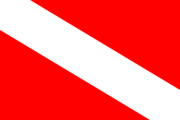 Barotseland BarotselandBarotseland Barotseland is a region in the western part of Zambia, and is the homeland of the Lozi people or Barotse who were previously known as Luyi or Aluyi. Its heartland is the Barotse Floodplain on the upper Zambezi River, also known as Bulozi or Lyondo, but it includes the surrounding higher ground of... (Zambia Zambia Zambia , officially the Republic of Zambia, is a landlocked country in Southern Africa. The neighbouring countries are the Democratic Republic of the Congo to the north, Tanzania to the north-east, Malawi to the east, Mozambique, Zimbabwe, Botswana and Namibia to the south, and Angola to the west.... ) |
Sub-national monarchy | Cognatic primogeniture | Lubosi II | October 2000 | |
 Buganda BugandaBuganda Buganda is a subnational kingdom within Uganda. The kingdom of the Ganda people, Buganda is the largest of the traditional kingdoms in present-day Uganda, comprising all of Uganda's Central Region, including the Ugandan capital Kampala, with the exception of the disputed eastern Kayunga District... (Uganda Uganda Uganda , officially the Republic of Uganda, is a landlocked country in East Africa. Uganda is also known as the "Pearl of Africa". It is bordered on the east by Kenya, on the north by South Sudan, on the west by the Democratic Republic of the Congo, on the southwest by Rwanda, and on the south by... ) |
Sub-national monarchy | Elective | Muwenda Mutebi II Muwenda Mutebi II of Buganda Ronald Edward Frederick Muwenda Kimera Mutebi II is the reigning Kabaka of the Kingdom of Buganda, a kingdom in modern-day Uganda. He is the thirty-sixth Kabaka of Buganda.-Claim to the throne:... |
31 July 1993 | Unknown |
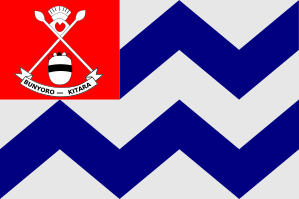 Bunyoro BunyoroBunyoro Bunyoro is a kingdom in Western Uganda. It was one of the most powerful kingdoms in East Africa from the 16th to the 19th century. It is ruled by the Omukama of Bunyoro... (Uganda Uganda Uganda , officially the Republic of Uganda, is a landlocked country in East Africa. Uganda is also known as the "Pearl of Africa". It is bordered on the east by Kenya, on the north by South Sudan, on the west by the Democratic Republic of the Congo, on the southwest by Rwanda, and on the south by... ) |
Sub-national monarchy | Iguru I | 1994 | ||
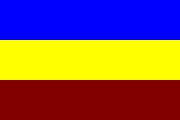 Busoga BusogaBusoga Busoga is a traditional Bantu kingdom in present-day Uganda.It is a cultural institution that promotes popular participation and unity among the people of Busoga, through cultural and developmental programs for the improved livelihood of the people of Busoga. It strives for a united people of... (Uganda Uganda Uganda , officially the Republic of Uganda, is a landlocked country in East Africa. Uganda is also known as the "Pearl of Africa". It is bordered on the east by Kenya, on the north by South Sudan, on the west by the Democratic Republic of the Congo, on the southwest by Rwanda, and on the south by... ) |
Sub-national monarchy | Elective | TBA | Unknown | |
 Kano KanoKano Kano is a city in Nigeria and the capital of Kano State in Northern Nigeria. Its metropolitan population is the second largest in Nigeria after Lagos. The Kano Urban area covers 137 sq.km and comprises six Local Government Area - Kano Municipal, Fagge, Dala, Gwale, Tarauni and Nassarawa - with a... (Nigeria Nigeria Nigeria , officially the Federal Republic of Nigeria, is a federal constitutional republic comprising 36 states and its Federal Capital Territory, Abuja. The country is located in West Africa and shares land borders with the Republic of Benin in the west, Chad and Cameroon in the east, and Niger in... ) |
Sub-national monarchy | Cognatic primogeniture | Ado Bayero | October 1963 | |
 Kanongesha-Lunda Kanongesha-LundaKanongesha-Lunda people The Kanongesha-Lunda are an ethnic group living mainly in the North-Western Province of Zambia under Senior Chief Kanongesha, around the provincial capital Mwinilunga.... (Angola Angola Angola, officially the Republic of Angola , is a country in south-central Africa bordered by Namibia on the south, the Democratic Republic of the Congo on the north, and Zambia on the east; its west coast is on the Atlantic Ocean with Luanda as its capital city... , Democratic Republic of the Congo Democratic Republic of the Congo The Democratic Republic of the Congo is a state located in Central Africa. It is the second largest country in Africa by area and the eleventh largest in the world... , and Zambia Zambia Zambia , officially the Republic of Zambia, is a landlocked country in Southern Africa. The neighbouring countries are the Democratic Republic of the Congo to the north, Tanzania to the north-east, Malawi to the east, Mozambique, Zimbabwe, Botswana and Namibia to the south, and Angola to the west.... ) |
Sub-national monarchy | Cognatic primogeniture | Mbumb II Muteb | 1997 | |
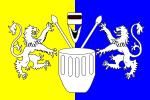 Toro Kingdom Toro Kingdom(Uganda Uganda Uganda , officially the Republic of Uganda, is a landlocked country in East Africa. Uganda is also known as the "Pearl of Africa". It is bordered on the east by Kenya, on the north by South Sudan, on the west by the Democratic Republic of the Congo, on the southwest by Rwanda, and on the south by... ) |
Sub-national monarchy | Cognatic primogeniture | Rukidi IV Rukidi IV of Toro Rukirabasaija Oyo Nyimba Kabamba Iguru Rukidi IV, King Oyo, is the reigning Omukama of Toro, in Uganda. He was born on 16 April 1992 to King Patrick David Mathew Kaboyo Olimi III and Queen Best Kemigisa Kaboyo. Three and half years later in 1995, Oyo ascended the throne and succeeded his father to... |
5 September 1995 | TBA |
 Rwenzururu Rwenzururu(Uganda Uganda Uganda , officially the Republic of Uganda, is a landlocked country in East Africa. Uganda is also known as the "Pearl of Africa". It is bordered on the east by Kenya, on the north by South Sudan, on the west by the Democratic Republic of the Congo, on the southwest by Rwanda, and on the south by... ) |
Sub-national monarchy | Cognatic primogeniture | Charles Mumbere Charles Mumbere Charles Wesley Mumbere is the king of the African kingdom of Rwenzururu, which is part of Uganda.-Biography:Rwenzururu was established in the 1962 as the result of a secessionist movement by the Bakonjo people in the mountainous region of western Uganda. The revolt was led by Mumbere's father,... |
1999 |
Former Commonwealth realms
(abolished 1970) (abolished 1960) (abolished 1964) (abolished 1966) (abolished 1992) (abolished 1963) (abolished 1971) (abolished 1961) (abolished 1962) (abolished 1963)Pre-colonial Africa
- Iron AgeIron AgeThe Iron Age is the archaeological period generally occurring after the Bronze Age, marked by the prevalent use of iron. The early period of the age is characterized by the widespread use of iron or steel. The adoption of such material coincided with other changes in society, including differing...
empires of North AfricaNorth AfricaNorth Africa or Northern Africa is the northernmost region of the African continent, linked by the Sahara to Sub-Saharan Africa. Geopolitically, the United Nations definition of Northern Africa includes eight countries or territories; Algeria, Egypt, Libya, Morocco, South Sudan, Sudan, Tunisia, and... - Medieval (8th to 13th century) IslamIslamIslam . The most common are and . : Arabic pronunciation varies regionally. The first vowel ranges from ~~. The second vowel ranges from ~~~...
ic empires (caliphateCaliphateThe term caliphate, "dominion of a caliph " , refers to the first system of government established in Islam and represented the political unity of the Muslim Ummah...
s) in North Africa - the medieval Sahelian kingdoms
- The Ethiopian EmpireEthiopian EmpireThe Ethiopian Empire also known as Abyssinia, covered a geographical area that the present-day northern half of Ethiopia and Eritrea covers, and included in its peripheries Zeila, Djibouti, Yemen and Western Saudi Arabia...
is notable as an empire in continuous existence from the 13th to the 20th centuries, succumbing neither to the Islamic conquests nor to European colonialism. - empires of the "transitional period" of the 15th to 19th centuries.
- Islamic sultanates of the SudanSudanSudan , officially the Republic of the Sudan , is a country in North Africa, sometimes considered part of the Middle East politically. It is bordered by Egypt to the north, the Red Sea to the northeast, Eritrea and Ethiopia to the east, South Sudan to the south, the Central African Republic to the...
and the Horn of AfricaHorn of AfricaThe Horn of Africa is a peninsula in East Africa that juts hundreds of kilometers into the Arabian Sea and lies along the southern side of the Gulf of Aden. It is the easternmost projection of the African continent... - kingdoms of West AfricaWest AfricaWest Africa or Western Africa is the westernmost region of the African continent. Geopolitically, the UN definition of Western Africa includes the following 16 countries and an area of approximately 5 million square km:-Flags of West Africa:...
succeeding the Sahelian kingdoms - kingdoms of Central and Southern Africa such as the Kongo Kingdom and the Mutapa Empire.
- Islamic sultanates of the Sudan
- The Merina KingdomMerina KingdomThe Merina Kingdom was a pre-colonial south-eastern African state that dominated most of what is now Madagascar. It spread outward from Imerina, the central highlands region primarily inhabited by the Merina ethnic group with a modern and historic political capital at Antananarivo and a spiritual...
of MadagascarMadagascarThe Republic of Madagascar is an island country located in the Indian Ocean off the southeastern coast of Africa...
.
20th century
-
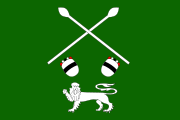 AnkoleAnkoleAnkole, also referred to as Nkore, is one of four traditional kingdoms in Uganda. The kingdom is located in the southwestern Uganda, east of Lake Edward. It was ruled by a monarch known as The Mugabe or Omugabe of Ankole. The kingdom was formally abolished in 1967 by the government of President...
AnkoleAnkoleAnkole, also referred to as Nkore, is one of four traditional kingdoms in Uganda. The kingdom is located in the southwestern Uganda, east of Lake Edward. It was ruled by a monarch known as The Mugabe or Omugabe of Ankole. The kingdom was formally abolished in 1967 by the government of President...
(UgandaUgandaUganda , officially the Republic of Uganda, is a landlocked country in East Africa. Uganda is also known as the "Pearl of Africa". It is bordered on the east by Kenya, on the north by South Sudan, on the west by the Democratic Republic of the Congo, on the southwest by Rwanda, and on the south by...
) (abolished 1967) -
.svg.png) BurundiBurundiBurundi , officially the Republic of Burundi , is a landlocked country in the Great Lakes region of Eastern Africa bordered by Rwanda to the north, Tanzania to the east and south, and the Democratic Republic of the Congo to the west. Its capital is Bujumbura...
BurundiBurundiBurundi , officially the Republic of Burundi , is a landlocked country in the Great Lakes region of Eastern Africa bordered by Rwanda to the north, Tanzania to the east and south, and the Democratic Republic of the Congo to the west. Its capital is Bujumbura...
(Kingdom of) (abolished 1966) Central African EmpireCentral African EmpireThe Central African Empire was a short-lived, self-declared autocratic monarchy that replaced the Central African Republic and was, in turn, replaced by the restoration of the republic. The empire was formed when Jean-Bédel Bokassa, President of the republic, declared himself Emperor Bokassa I on...
(abolished 1979) (annexed by Belgium 1908) (Kingdom of)Kingdom of EgyptThe Kingdom of Egypt was the first modern Egyptian state, lasting from 1922 to 1953. The Kingdom was created in 1922 when the British government unilaterally ended its protectorate over Egypt, in place since 1914. Sultan Fuad I became the first king of the new state...
(abolished 1953) (Empire of) (abolished 1975) (Kingdom of)Kingdom of LibyaThe Kingdom of Libya, originally called the United Libyan Kingdom came into existence upon independence on 24 December 1951 and lasted until a coup d'état led by Muammar Gaddafi on 1 September 1969 overthrew King Idris of Libya and established the Libyan Arab Republic.- Constitution :Under the...
(abolished 1969) (not recognized; abolished 1970) (Kingdom of) (abolished 1961) (Kingdom of) (abolished 1957) ZanzibarZanzibarZanzibar ,Persian: زنگبار, from suffix bār: "coast" and Zangi: "bruin" ; is a semi-autonomous part of Tanzania, in East Africa. It comprises the Zanzibar Archipelago in the Indian Ocean, off the coast of the mainland, and consists of numerous small islands and two large ones: Unguja , and Pemba...
(Sultanate of) (abolished 1964)

